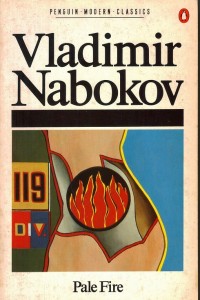I wish you to gasp not only at what you read

Pale Fire
by Vladimir Nabokov
I need to let you know from the start that this is one crazy crazy book. The structure, the plot and the characters are complex to the point of inscrutable. This is truly experimental literary fiction.
How to describe this book? The poet and academic John Shade has been murdered and this is his last poem, introduced and analysed by a neighbour and colleague of the poet, Charles Kinbote. Kinbote is clearly crazy, but the question is exactly how crazy.
Kinbote’s “commentary” mostly ignores the actual poem and rambles on about the last king of Zembla, the country he has emigrated from to the small New England college where he met Shade. The story of this king is one of wild adventure, preposterous even, and Kinbote is clearly obsessed with it. He had told this story to Shade in the hope that the great poet would write a great poem about it, but that’s not what this final poem is and Kinbote’s disappointment is palpable.
“What if we awake one day, all of us, and find ourselves utterly unable to read? I wish you to gasp not only at what you read but at the miracle of its being readable (so I used to tell my students)…I can do what only a true artist can do – pounce upon the forgotten butterfly of revelation, wean myself abruptly from the habit of things, see the web of the world, and the warp and weft of that web.”
The whole conceit, and Kinbote himself, are often frustrating, occasionally tedious and frankly wholly ridiculous and yet at times it becomes almost, almost, believable. Kinbote’s obsessive nature has attached itself to his learned neighbour and he has clearly read the situation wrong time and time again, convincing himself that he became Shade’s dearest friend on the basis of flimsy evidence. It’s not a new story, but it’s nevertheless an interesting one and it’s being told in a very new way.
Thankfully, the scholarly frame of the novel is not entirely po-faced. This is a comedy, packed full of satire, poking fun at poets and scholars and literary criticism. Kinbote is somehow both subtly ambiguous and a broad comic character. The language is laughably over-the-top academic and delights in putting together pleasing sounds and amazing, if unwieldy, sentences.
“The heating system was a farce, depending as it did on registers in the floor wherefrom the tepid exhalations of a throbbing and groaning basement furnace were transmitted to the rooms with the faintness of a moribund’s last breath. By occluding the temperatures upstairs I attempted to give more energy to the register in the living room but its climate proved to be incurably vitiated by there being by there being nothing between it and the arctic regions save a sleezy front door without a vestige of a vestibule.”
It’s a clever balancing act and I would be thoroughly impressed by a book that made me laugh out loud despite such an outlandish structure if I hadn’t found other sections painfully tedious. This is a short book but it took me a long time to read, partly because I kept putting it down and declaring “This is batshit insane.” Which it is.
“The coming of summer presented a problem in optics: the encroaching foliage did not always see eye to eye with me: it confused a green monocle with an opaque occludent, and the idea of protection with that of obstruction.”
I must admit, this is one of those books I’m a little bit proud of having got through. Which perhaps undersells it. Many people consider this a masterpiece and I certainly see that there’s plenty to admire but I don’t think Nabokov will ever be a favourite of mine.
First published 1962 by G B Putnam’s Sons.
Source: Secondhand, probably from the Oxfam Bookshop on Park Street, Bristol.